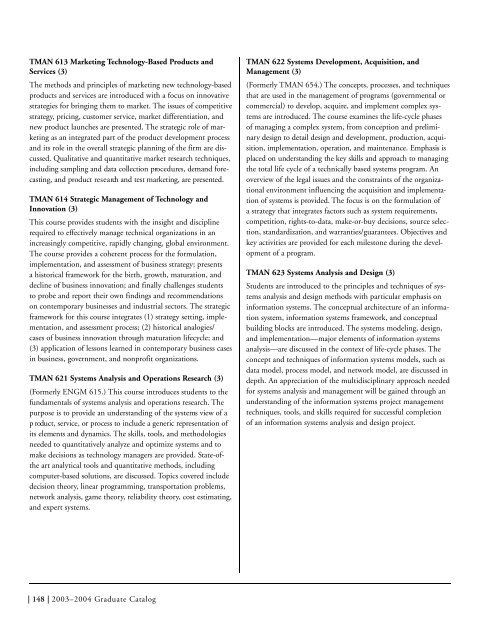A+B. Intro_SJ.1 - University of Maryland University College
A+B. Intro_SJ.1 - University of Maryland University College
A+B. Intro_SJ.1 - University of Maryland University College
Create successful ePaper yourself
Turn your PDF publications into a flip-book with our unique Google optimized e-Paper software.
TMAN 613 Marketing Technology-Based Products and<br />
Services (3)<br />
The methods and principles <strong>of</strong> marketing new technology-based<br />
products and services are introduced with a focus on innovative<br />
strategies for bringing them to market. The issues <strong>of</strong> competitive<br />
strategy, pricing, customer service, market differentiation, and<br />
new product launches are presented. The strategic role <strong>of</strong> marketing<br />
as an integrated part <strong>of</strong> the product development process<br />
and its role in the overall strategic planning <strong>of</strong> the firm are discussed.<br />
Qualitative and quantitative market research techniques,<br />
including sampling and data collection pro c e d u res, demand forecasting,<br />
and product re s e a rch and test marketing, are presented.<br />
TMAN 614 Strategic Management <strong>of</strong> Technology and<br />
Innovation (3)<br />
This course provides students with the insight and discipline<br />
required to effectively manage technical organizations in an<br />
increasingly competitive, rapidly changing, global environment.<br />
The course provides a coherent process for the formulation,<br />
implementation, and assessment <strong>of</strong> business strategy; presents<br />
a historical framework for the birth, growth, maturation, and<br />
decline <strong>of</strong> business innovation; and finally challenges students<br />
to probe and report their own findings and recommendations<br />
on contemporary businesses and industrial sectors. The strategic<br />
framework for this course integrates (1) strategy setting, implementation,<br />
and assessment process; (2) historical analogies/<br />
cases <strong>of</strong> business innovation through maturation lifecycle; and<br />
(3) application <strong>of</strong> lessons learned in contemporary business cases<br />
in business, government, and nonpr<strong>of</strong>it organizations.<br />
TMAN 621 Systems Analysis and Operations Research (3)<br />
(Formerly ENGM 615.) This course introduces students to the<br />
fundamentals <strong>of</strong> systems analysis and operations research. The<br />
purpose is to provide an understanding <strong>of</strong> the systems view <strong>of</strong> a<br />
p roduct, service, or process to include a generic re p resentation <strong>of</strong><br />
its elements and dynamics. The skills, tools, and methodologies<br />
needed to quantitatively analyze and optimize systems and to<br />
make decisions as technology managers are provided. State-<strong>of</strong>the<br />
art analytical tools and quantitative methods, including<br />
computer-based solutions, are discussed. Topics covered include<br />
decision theory, linear programming, transportation problems,<br />
network analysis, game theory, reliability theory, cost estimating,<br />
and expert systems.<br />
TMAN 622 Systems Development, Acquisition, and<br />
Management (3)<br />
(Formerly TMAN 654.) The concepts, processes, and techniques<br />
that are used in the management <strong>of</strong> programs (governmental or<br />
commercial) to develop, acquire, and implement complex systems<br />
are introduced. The course examines the life-cycle phases<br />
<strong>of</strong> managing a complex system, from conception and prelimin<br />
a ry design to detail design and development, production, acquisition,<br />
implementation, operation, and maintenance. Emphasis is<br />
placed on understanding the key skills and appro a c h to managing<br />
the total life cycle <strong>of</strong> a technically based systems program. An<br />
overview <strong>of</strong> the legal issues and the constraints <strong>of</strong> the organizational<br />
environment influencing the acquisition and implementation<br />
<strong>of</strong> systems is provided. The focus is on the formulation <strong>of</strong><br />
a strategy that integrates factors such as system requirements,<br />
competition, rights-to-data, make-or-buy decisions, source selection,<br />
standardization, and warranties/guarantees. Objectives and<br />
key activities are provided for each milestone during the development<br />
<strong>of</strong> a program.<br />
TMAN 623 Systems Analysis and Design (3)<br />
Students are introduced to the principles and techniques <strong>of</strong> systems<br />
analysis and design methods with particular emphasis on<br />
information systems. The conceptual architecture <strong>of</strong> an information<br />
system, information systems framework, and conceptual<br />
building blocks are introduced. The systems modeling, design,<br />
and implementation—major elements <strong>of</strong> information systems<br />
analysis—are discussed in the context <strong>of</strong> life-cycle phases. The<br />
concept and techniques <strong>of</strong> information systems models, such as<br />
data model, process model, and network model, are discussed in<br />
depth. An appreciation <strong>of</strong> the multidisciplinary approach needed<br />
for systems analysis and management will be gained through an<br />
understanding <strong>of</strong> the information systems project management<br />
techniques, tools, and skills required for successful completion<br />
<strong>of</strong> an information systems analysis and design project.<br />
| 148 | 2003–2004 Graduate Catalog

















